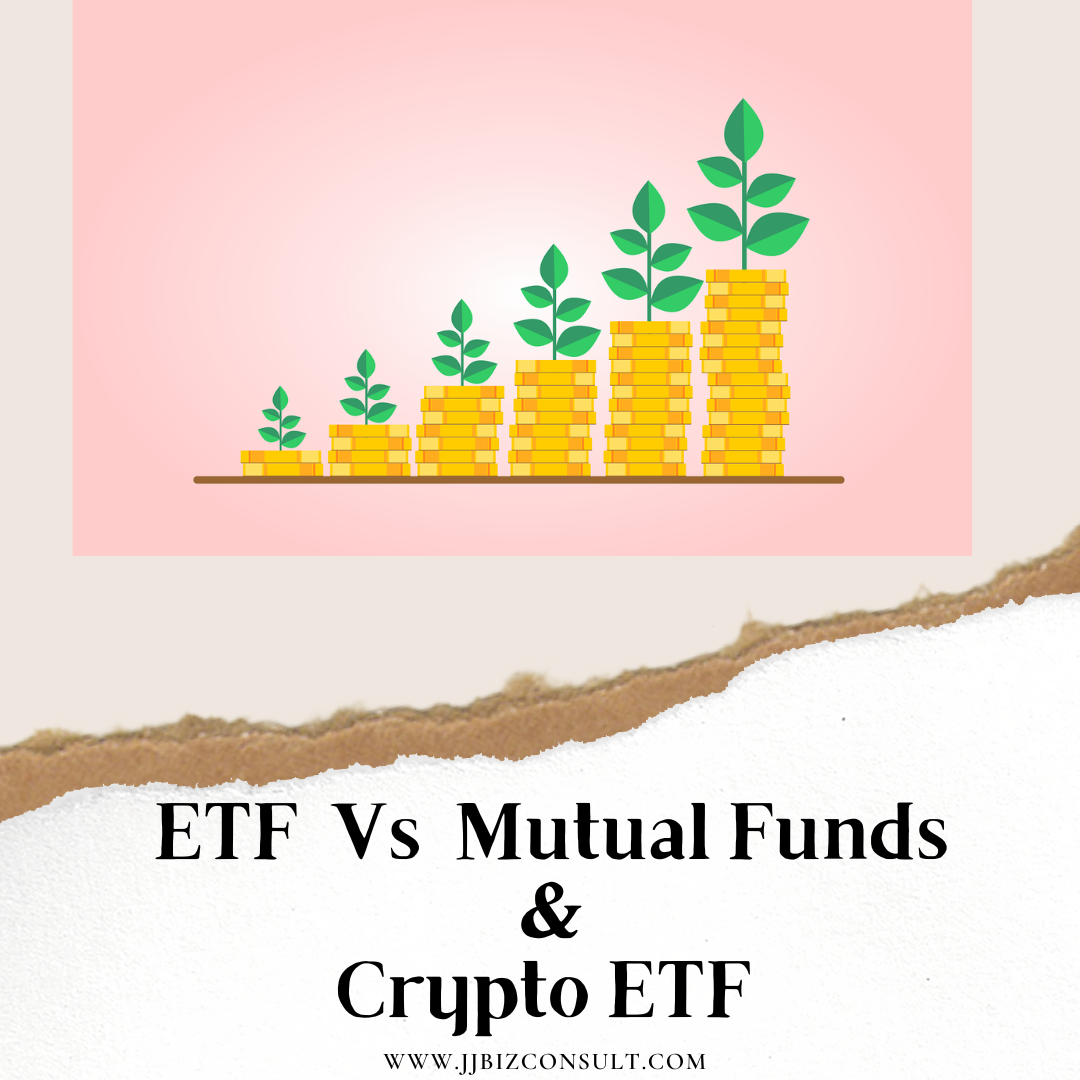ETF Vs Mutual Funds & Crypto ETF – Know it all

ETF Vs Mutual Funds & Crypto ETF – Know it all

What is ETF
An ETF, or exchange-traded fund, is a type of investment fund that holds a collection of securities, such as stocks, bonds, or commodities, and trades on an exchange like a stock. ETFs provide investors with a way to gain exposure to a diversified portfolio of assets in a single investment, and they can be bought and sold throughout the trading day like a stock.
ETFs can be designed to track a specific index, such as the S&P 500, or to follow a particular sector or theme, such as technology or renewable energy. This means that the value of an ETF is based on the performance of the underlying assets it holds.
One of the main benefits of ETFs is that they offer diversification, which can help to reduce risk. Additionally, ETFs tend to be more tax-efficient than other types of investment funds and often have lower expense ratios.
However, it is worth noting that ETFs also have management fees, which will reduce the overall return on investment and they may not always perfectly track the underlying asset’s performance.

What is Mutual Fund
A mutual fund is a type of investment fund that pools money from multiple investors to purchase a diversified portfolio of securities, such as stocks, bonds, or commodities. The fund is managed by a professional fund manager who makes investment decisions on behalf of the fund’s shareholders.
Each mutual fund has a specific investment objective, such as growth, income, or preservation of capital. This objective is reflected in the types of securities the fund holds and the strategies used by the fund manager.
The value of a mutual fund is based on the value of the securities it holds, known as the net asset value (NAV). NAV is calculated by taking the total value of the securities in the fund and dividing it by the number of shares outstanding.
One of the main benefits of mutual funds is that they provide diversification, which can help to reduce risk. Additionally, mutual funds offer professional management and can be a convenient way for investors to gain exposure to a variety of assets.
However, it is worth noting that mutual funds also have management fees, which will reduce the overall return on investment. Additionally, mutual funds are typically bought and sold at the end of the trading day at the NAV price, and they may not always perfectly track the underlying assets’ performance.
ETF Vs Mutual Fund
Exchange-traded funds (ETFs) and mutual funds are both types of investment funds that pool money from multiple investors to purchase a diversified portfolio of securities. However, there are a few key differences between the two:
- Trading: ETFs can be bought and sold throughout the trading day on an exchange, similar to stocks. Mutual funds, on the other hand, are typically bought and sold at the end of the trading day at the net asset value (NAV) price.
- Fees: ETFs tend to have lower expense ratios than mutual funds, which means they can be less expensive for investors.
- Diversification: Both ETFs and mutual funds provide diversification by holding a variety of assets in a single investment, but ETFs can be more specific about the assets they hold, for example a technology ETF or a renewable energy ETF.
- Tax efficiency: ETFs are generally more tax-efficient than mutual funds because they can be structured in a way that allows them to avoid triggering capital gains taxes when securities are bought and sold within the fund.
- Liquidity: ETFs tend to have higher liquidity than mutual funds, meaning they can be bought and sold more easily and with narrower bid-ask spreads.
In summary, ETFs and mutual funds both offer diversification and professional management, but ETFs tend to be more tax-efficient, have lower expense ratios, and can be traded throughout the day, while mutual funds are bought and sold at the end of the day at the NAV price.
Which is the Best Investment ETF Vs Mutual Funds

Whether ETFs or mutual funds are the “best” investment depends on an individual’s specific investment goals and risk tolerance. Both ETFs and mutual funds have their own unique set of benefits and drawbacks.
ETFs tend to have lower expense ratios, which means they can be less expensive for investors. Additionally, ETFs are generally more tax-efficient and have higher liquidity than mutual funds. ETFs can also be bought and sold throughout the trading day, like stocks, which allows for more flexibility and control over one’s investment.
On the other hand, mutual funds offer professional management and can be a convenient way for investors to gain exposure to a variety of assets. They also tend to have a longer history of performance which can help in evaluating the fund manager’s skills.
When it come to ETF Vs Mutual Funds, The best investment for you will depend on your financial goals, risk tolerance and investment horizon. It is important to conduct thorough research, consider your options and consult with a financial advisor before making any investment decisions.
What is Cryptocurrency ETF
A cryptocurrency ETF is a type of exchange-traded fund that holds a collection of cryptocurrencies, such as Bitcoin or Ethereum, and trades on an exchange like a stock. These ETFs provide investors with a way to gain exposure to the cryptocurrency market without having to directly buy and store the digital currencies themselves.
Similar to other ETFs, a cryptocurrency ETF aims to track the performance of a specific group of cryptocurrencies or the overall cryptocurrency market. This means that the value of a cryptocurrency ETF is based on the performance of the underlying digital currencies it holds.
Investing in a cryptocurrency ETF allows investors to gain exposure to the cryptocurrency market while avoiding some of the risks associated with buying and storing digital currencies directly, such as hacking or theft. Additionally, ETFs can be more tax-efficient than directly investing in digital currencies.
However, it is worth noting that cryptocurrency ETFs are not yet widely available and they may not be offered in all countries. Additionally, they may have higher management fees than other ETFs and they may not always perfectly track the underlying assets’ performance.
Crypto ETF Vs Mutual Funds

There are both ETFs and mutual funds that invest in cryptocurrencies as well. A cryptocurrency ETF is a type of ETF that holds a collection of cryptocurrencies, such as Bitcoin or Ethereum, and trades on an exchange like a stock. These ETFs provide investors with a way to gain exposure to the cryptocurrency market without having to directly buy and store the digital currencies themselves.
Similarly, a cryptocurrency mutual fund is a type of mutual fund that holds a collection of cryptocurrencies as underlying assets. These funds are managed by professional fund managers who make investment decisions on behalf of the fund’s shareholders.
Benefits & risks of investing in Crypto first-hand rather than through an ETF ?
Investing in Bitcoin or Ethereum first-hand, rather than through an ETF, allows for greater control over one’s investment. For example, you can choose to hold onto the digital currency for a longer period of time, or you can choose to sell it at any point in the market. However, it also comes with greater risk, as the price of these digital currencies can be highly volatile and subject to rapid changes. Additionally, there is a risk of hacking or theft when storing these currencies in a digital wallet.
An ETF, on the other hand, allows for a more passive investment, as the ETF is managed by a fund manager. Additionally, an ETF is traded on an exchange, which means that it can be bought and sold throughout the trading day like other stocks. However, ETFs may have additional fees and the price of the ETF may not always track the underlying asset perfectly.
In summary, investing in Bitcoin or Ethereum first-hand offers more control and potentially higher returns, but also comes with higher risk. An ETF may offer a more passive investment and less risk, but also comes with additional fees and possible deviation from the underlying asset’s performance.
Read more Trending News on this site: Can cryptocurrencies replace traditional currencies – A perspective
Click here to get 12% Off & Free Wig, Check Now!





